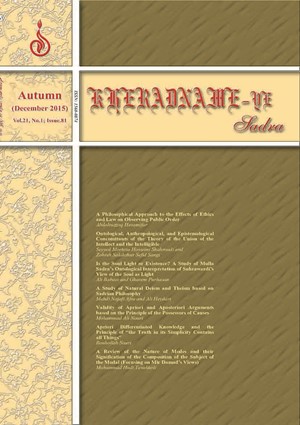-
-
List of Articles
-
Open Access Article
1 - سرمقاله
-
Open Access Article
2 - A Philosophical Approach to the Effects of Ethics and Law on Observing Public Order
Abdolrazzaq Hesamifar -
Open Access Article
3 - Ontological, Anthropological, and Epistemological Concomitants of the Theory of the Union of the Intellect and the Intelligible
Seyyed Morteza Hosseini Shahroudi Zohreh Salahshur Sefid Sangi -
Open Access Article
4 - Is the Soul Light or Existence? A Study of Mulla Sadra’s Ontological Interpretation of Suhrawardi’s View of the Soul as Light
Qasim Pourhassan Ali Babaei -
Open Access Article
5 - A Study of Natural Deism and Theism based on Sadrian Philosophy
Mehdi Najafi Afra Ali Heydari -
Open Access Article
6 - Validity of Aposteriori and Apriori arguments based on the Principle of the Possessors of Causes
Mohammad Ali Nouri -
Open Access Article
7 - Apriori Differentiated Knowledge and the Principle of “the Truth in its Simplicity Contains all Things”
Rouhollah Souri -
Open Access Article
8 - A Review of the Nature of Modes and their Signification of the Composition of the Subject of the Modal (Focusing on Mir Damad’s Views)
Mohammad Hadi Tavakkoli
-
The rights to this website are owned by the Raimag Press Management System.
Copyright © 2017-2026







